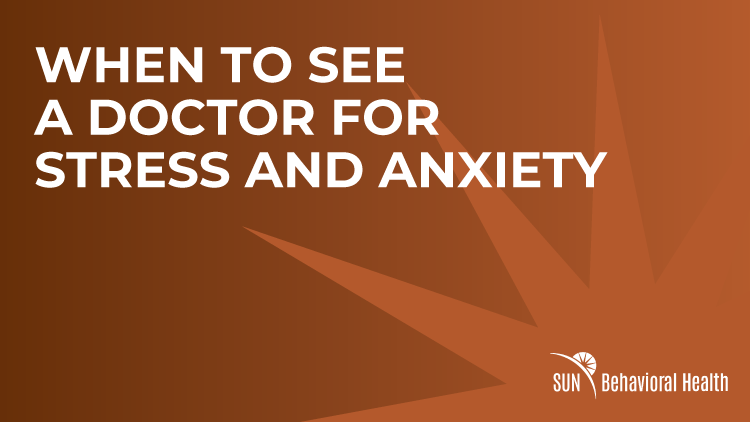Services

Life will always come with stress – that’s something we can’t avoid. Our cars break down, our kids get sick, we feel pressure at work, we have health scares, and to top it all off, the laundry never seems to stop. This is the kind of stress we’ve been conditioned to handle since we were children. But when stress becomes a way of life rather than the occasional event, is it still normal? When do we say “this is too much”? It might be sooner than you think.
At SUN Behavioral Delaware, we want you to know you are not powerless against the symptoms of stress and anxiety. If stress is beginning to interfere with your life or keep you from your goals, there are healthy solutions for relief.
First and foremost, if your anxiety is concerning you enough to wonder if it’s healthy, don’t hesitate to speak with your doctor. It’s normal to have bouts of stress and anxiety but if you’re experiencing it more than usual, there could be a simple medical explanation. An ongoing dialogue with your primary care physician is always a good thing when it comes to your health.
If you’re not ready to make an appointment just yet, let’s talk about some warning signs that might indicate it’s time to see a doctor.
As mentioned earlier, if you suspect that your stress is causing physical issues, it’s probably time to see your doctor. Let’s talk about some of the physical symptoms of high stress or anxiety:
Your doctor will likely start off with a physical exam to rule out any other medical causes for your anxiety. Vitamin deficiencies, heart and thyroid disorders, viruses, and even hormones can mimic anxiety or depression. Next, they’ll ask you some questions about your stress and anxiety. They will ask about what’s going on in your life to cause the stress and how it’s impacting you on a physical and emotional level. They’ll also want to know whether or not you have a family history of mood disorders like depression or anxiety.
Doctors will often look for physical indicators to determine the severity of your anxiety. It’s important that you give your doctor as much detail as possible so they can properly diagnose you. They’ll work with you to find out what’s causing your distress, and that will help them form a treatment plan.
It can feel uncomfortable to speak with your doctor about what’s causing your stress, especially if you’ve never done that before. Rest assured - they’re not there to pass judgment on you. Your doctor is there to help.
If you’re not noticing any physical issues due to stress, that doesn’t mean that your stress levels are “normal.” You may still need to see a doctor if you are feeling emotionally overwhelmed. Stress affects not just the way you think and feel, but your decision-making abilities and behaviors as well. Here are some emotional signs that indicate you may need medical care:
“Normal” levels of stress and anxiety would mean that your feelings are not interfering with your life. You’re sleeping on a relatively normal schedule, you’re eating normally, and you’re still finding a healthy work/life balance. If you’re feeling “normal” stress, you should be able to turn to a healthy coping mechanism to feel better, like exercise, meditation, or talking to a friend. “Normal” stress and anxiety simply mean that you’re functioning as usual, even when you’re experiencing these feelings.
If medical conditions are ruled out, it may be time to see a mental health specialist. A psychiatrist and various mental health professionals can diagnose and treat anxiety disorders.
Diagnosis at SUN Behavioral Health Delaware includes a psychological evaluation and use of the Diagnostic and Statistical Manual of Mental Disorders (DSM) criteria. Treatment for stress and anxiety can include psychotherapy and/or medications. A common example of psychotherapy, or talk therapy, is cognitive-behavioral therapy (CBT). CBT helps people develop new thought patterns, which help change behaviors and reactions.
Need Help Dealing With Stress And Anxiety?
At SUN, we can help you manage your stress, find and create healthy coping mechanisms, and live a life that isn’t hindered by your anxiety. To learn more about treatment for stress and anxiety, contact us today at 614-706-2786.
Chronic stress is the constant feeling of impending doom or “pressure” that lasts for a long period of time.
Anxiety can cause gastrointestinal distress, which includes nausea, diarrhea, and IBS.
If you are noticing any physical side effects as a result of stress, including stomach pain, it may be time to see your doctor.